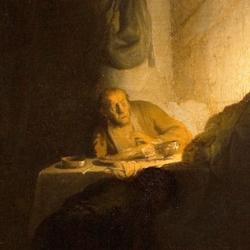One of the earliest Trinitarian heresies is called “modalism.” It taught that the “persons” of the Trinity are not distinct persons, but only the masks or roles that the one Person of God adopts at various times.
The fundamental problem with modalism is that it stretches out a veil, or digs a chasm, between God as He reveals Himself and God as He is. God shows Himself as loving, kind, gentle Jesus, but can we know that’s really who He is? Can we know what He’s really up to?
According to modalism, we can’t know. God never shows Himself. God always appears in masks, masks that may well distort as much as they reveal. Our instinct to suspect that our failures show God is out to get us is a form of practical modalism.
Many Christians celebrate the Lord’s Supper with these same suspicions. God seems to invite us to His table, where He offers us His Son in His Spirit. He seems to be pleased that we’ve accepted His invitation. But can we really know what God is doing at this table? Couldn’t He just as well be laying a trap, making this table a snare? Can we really be sure that He favors us?
This is Eucharistic modalism, and it is unbelief. God is not Atreus or Titus offering us a macabre feast. God reveals Himself at His table as Host, as Food, as Life. That’s not pretence. That is not a mask. That’s what’s really happening, and we are called to believe it, and to eat and drink.














